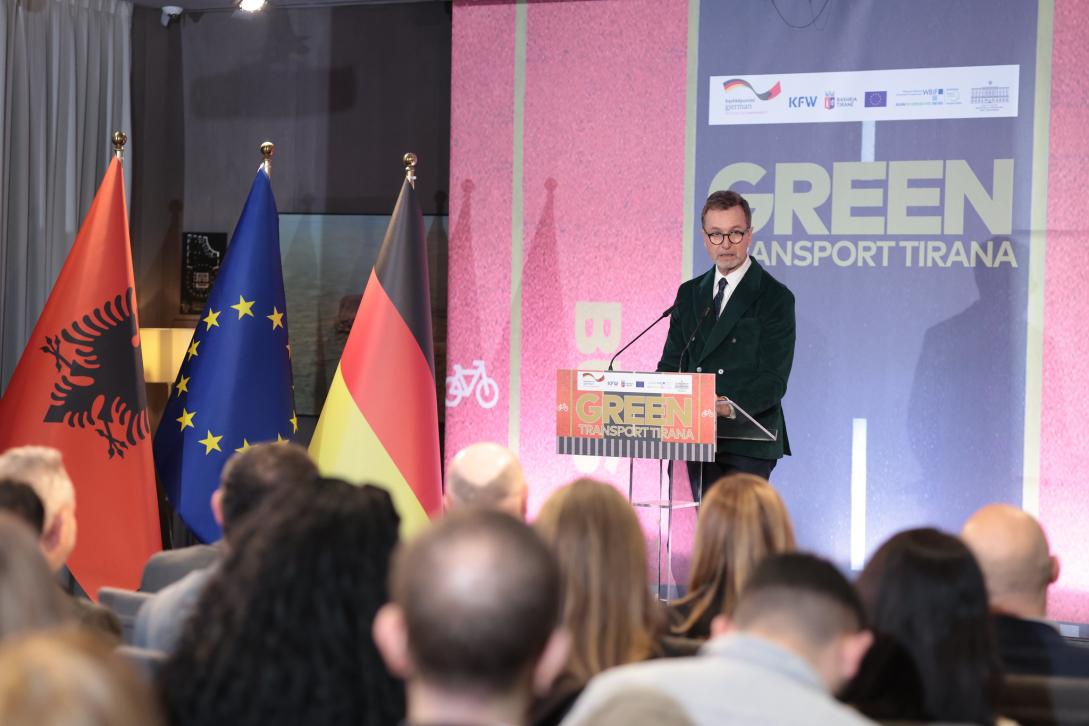European Union and Germany support green transport in Tirana with 81.2 million Euro investments

Tirana, March 6, 2024 – The Green Transport Tirana project was presented today, marking a significant step towards modernizing public transport in the Albanian capital. Funded by the European Union, Germany and the Municipality of Tirana, this project aims at developing, implementing and operating Tirana’s first electric Bus Rapid Transport system, known as “e-BRT”, on three of the main transport corridors in Tirana: Unaza, Tirana e Re and Kombinat-Kinostudio.
The purpose of the project is not only to improve service delivery in public transport but also to reduce CO2-emissions and local pollutants, thus contributing to climate and environmental protection targets. The total project costs of €110.26 million are covered by funding from the EU through a non-repayable grant of €31.09 million (via the Western Balkans Investment Framework), a €50 million loan from KfW Development Bank, and €29.17 million by the Municipality of Tirana.
EU Ambassador Silvio Gonzato, German Ambassador Karl Bergner, Mayor of Tirana Erion Veliaj and Director of KfW Office Albania, Brit Horschke, were present at the launching of the project.
“The European Union is very proud to join forces with Germany and the Tirana municipality to build the future network of a zero-emission electric bus transport for Tirana. Thanks to the new e-bus network, the public transport system will be faster, cleaner, more attractive to the citizens, and therefore help reducing the number of cars in the city. We estimate that the project will significantly contribute to decarbonise the city and reduce harmful emissions, leading to cleaner air for the benefit of Tirana residents,” said EU Ambassador Gonzato during his remarks.
“Our investment in clean and reliable public transport underscores the commitment of the German Federal Government to support Albania in its transformation towards becoming a member of the European Union. This project is money well spent for the citizens of Tirana, who will directly benefit from faster transport, less traffic jams and a cleaner environment. This is what Team Germany, together with Team Europe and the Team of the Bashkia of Tirana will deliver,” said German Ambassador Bergner.
"This project will transform three main urban transport lines in the city, making them many times faster; so, from 9 and 9.5 km per hour we will go to 20 km/hour. We will have an extraordinary surge in terms of public transport in Tirana. Today we are in a situation where we will start with three main axes, within this year: The first axis is Kinostudio-Kombinat; the second, Tirana e Re; the third axis is Unaza. If a complete round trip on the Ring today takes 54 minutes, with the new urban line it will take 27 minutes. Of course, it will be easier make it through the Unaza with the bus rather than a private car", emphasized the Mayor of Tirana, Veliaj.
The electric bus rapid transport system is projected to increase the average speed of buses on the selected bus lines, which will significantly improve public transport efficiency. The project is expected to prevent approximately 4,300 tons of CO2 emissions annually, as well as reduce the emissions of particulate matter (PM) and nitrogen oxide by an average of 25.55 tons of NOx and 0.18 tons of PM per year, contributing for a cleaner air and to climate protection efforts.
The electric Bus Rapid Transport system will be implemented on the 3 following corridors:
L15 – East – West line from Kinostudio to Kombinat 17 km considering in both directions
L14- Unaza, circular line city centre 3rd ring – 14 km considering both directions
L13 - Tirana e Re, Circular Line; central and western part of the City– 21 km considering both directions.
Background information
The WBIF is a joint initiative of the European Commission, the Council of Europe Development Bank (CEB), the European Bank for Reconstruction and Development (EBRD), the European Investment Bank (EIB), bilateral donors and Western Balkans beneficiaries launched in December 2009 with the purpose to deliver finance and technical assistance for strategic investments. The KfW and the World Bank subsequently joined the platform.
In Albania, KfW implements the German Financial Cooperation and provides grant aid and concessional loans for key investments and project-related consultancy services. The German cooperation with Albania started in 1988. Since then, the German Government has committed more than one billion EUR for development projects and programs. The Sustainable Urban Development and the energy sector are priority area within the scope of the German Financial Cooperation with Albania, for which the German Government has committed more than 800 million EUR since 1988.
